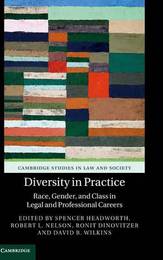
|
Diversity in Practice: Race, Gender, and Class in Legal and Professional Careers
Hardback
Main Details
| Title |
Diversity in Practice: Race, Gender, and Class in Legal and Professional Careers
|
| Authors and Contributors |
Edited by Spencer Headworth
|
|
Edited by Robert L. Nelson
|
|
Edited by Ronit Dinovitzer
|
|
Edited by David B. Wilkins
|
| Series | Cambridge Studies in Law and Society |
|---|
| Physical Properties |
| Format:Hardback | | Pages:454 | | Dimensions(mm): Height 235,Width 158 |
|
| ISBN/Barcode |
9781107123656
|
| Classifications | Dewey:340.023 |
|---|
| Audience | | Professional & Vocational | |
|---|
| Illustrations |
33 Tables, black and white
|
|
Publishing Details |
| Publisher |
Cambridge University Press
|
| Imprint |
Cambridge University Press
|
| Publication Date |
1 April 2016 |
| Publication Country |
United Kingdom
|
Description
Expressions of support for diversity are nearly ubiquitous among contemporary law firms and corporations. Organizations back these rhetorical commitments with dedicated diversity staff and various diversity and inclusion initiatives. Yet, the goal of proportionate representation for people of color and women remains unrealized. Members of historically underrepresented groups remain seriously disadvantaged in professional training and work environments that white, upper-class men continue to dominate. While many professional labor markets manifest patterns of demographic inequality, these patterns are particularly pronounced in the law and elite segments of many professions. Diversity in Practice analyzes the disconnect between expressed commitments to diversity and practical achievements, revealing the often obscure systemic causes that drive persistent professional inequalities. These original contributions build on existing literature and forge new paths in explaining enduring patterns of stratification in professional careers. These more realistic assessments provide opportunities to move beyond mere rhetoric to something approaching diversity in practice.
Author Biography
Spencer Headworth is Graduate Research Coordinator at the American Bar Foundation and a Ph.D. candidate in Northwestern University's Department of Sociology. He studies crime and social control, law, inequality, organizations, and professions. His dissertation, 'Policing Welfare', examines dedicated welfare fraud control units, a novel intersection between the worlds of public benefits and law enforcement. Robert L. Nelson is the MacCrate Research Chair in the Legal Profession at the American Bar Foundation and Professor of Sociology and Law at Northwestern University, Illinois. He studies law, inequality, and the legal profession. He is the author of Legalizing Gender Inequality: Courts, Markets, and Unequal Pay for Women in America (with William Bridges, Cambridge, 1999), which won the best book award from the American Sociological Association. From 2004-15, Nelson served as Director of the American Bar Foundation. Ronit Dinovitzer is Associate Professor of Sociology at the University of Toronto and is cross-appointed to the Institute for Management and Innovation. Her work focuses on the social structure of the legal profession and on professional ethics. Ronit is a Faculty Fellow of the American Bar Foundation where she is a co-investigator on 'After the JD', the first national longitudinal study of US law graduates, and she has now completed the first national survey of Canadian law graduates. David B. Wilkins is Lester Kissel Professor of Law and Director of the Center on the Legal Profession at Harvard Law School, Massachusetts. He is a globally recognized scholar on the legal profession, having written over eighty articles and coauthored one of the leading casebooks in the field. Professor Wilkins is a Member of the American Academy of Arts and Sciences, and a Corresponding Member of the Spanish Royal Academy of Doctors.
Reviews'[Headworth, Nelson, Dinovittzer and Wilkins] find that while many professional labor markets manifest patterns of demographic inequality, these patterns are particularly pronounced in the law and elite segments of other professions. Contributors to their volume analyze the disconnect between expressed commitments to diversity and practical achievements, identifying the often obscure systemic causes that drive persistent professional inequalities.' Law and Social Inquiry
|